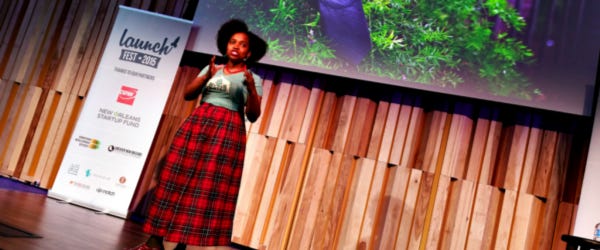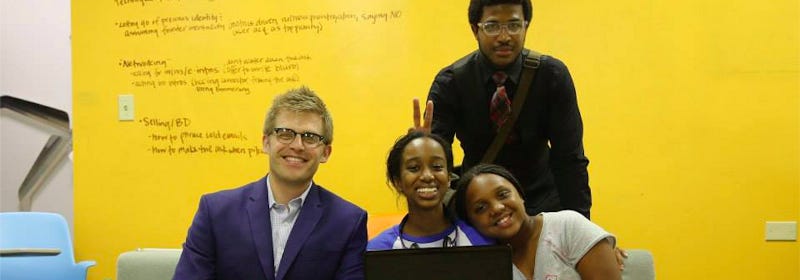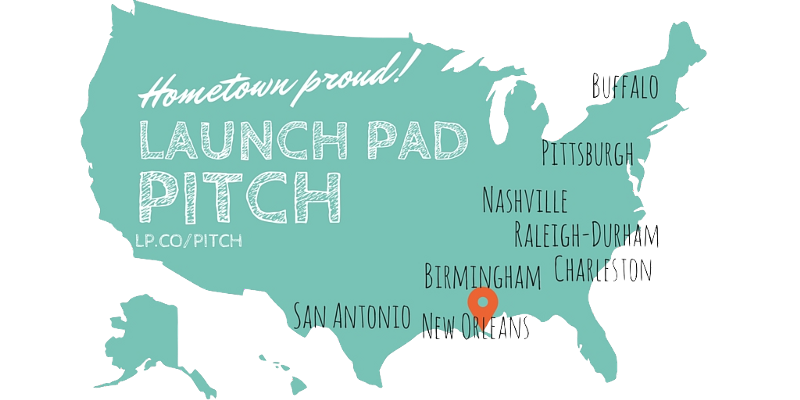Our Entrepreneurial Spirit Will Make America Great (Again and Again)
In communities around the country the American economic structure has been shaken to its core. The economic contract was work hard and live…
In communities around the country the American economic structure has been shaken to its core. The economic contract was work hard and live the American dream — job security, home ownership and a secure retirement.
While politicians hark back to those days of yore, the challenge is ours — the entrepreneurs, creators, and doers — to make America great in the face of tremendous change.
We are facing a world where the manufacturing jobs are overseas, automation is replacing service jobs and software is eating middle management. Too many people are unprepared for this new economy.
These changes begin to explain the anxiety that people in this country are feeling that politicians are tapping into.
As Thomas Friedman explains, we are experiencing the accelerating march of globalization, technology and climate change. The first two are inexorable, the third we pray is not.

Tabitha Bethune of the The WildLife Reserve pitching at Launch Fest in April 2015.
Launch Pad’s mission is to help people in rising markets succeed through entrepreneurship. I’d like to share my viewpoint on the challenges we face and what we are doing to showcase the entrepreneurs in eight cities who are solving real problems.
Employment Disrupted
A consequence of technological advancement is that automation enables companies to do more with less and requires that people move up the skill development ladder to find a role in the economy. In their report, the Future of Employment, Carl Benedikt Frey and Michael A. Osborne estimate:
“47 percent of total US employment is in the high risk category, meaning that associated occupations are potentially automatable over some unspecified number of years, perhaps a decade or two.”
Yet, according to research by the Kauffman Foundation, over the last twenty years, most private sector jobs have been created by businesses less than five years old.
“When it comes to job-creating power, it is not the size of the business that matters as much as it is the age. New and young companies are the primary source of job creation in the American economy.”
Traditional employment structures are shifting. Work is becoming more flexible and independent. People are increasingly able to work from anywhere. And continually updating our skills to stay adept in new technologies will be critical.
The Importance of Education
With the economy being transformed, education has never been more important in helping people to develop the skills needed to compete for jobs. With automation attacking unskilled labor, moving up the ladder to skilled jobs above the API is critical. We are in a brave new world of program or be programmed.
Have you heard the one about the programmer who couldn’t find a job?
Yeah, me neither.
Programmers are this generation's skilled auto workers — eminently employable with pricing power in the market. The White House recognizes how critical technical literacy is:
“Computer science is a “new basic” skill necessary for economic opportunity and social mobility.”
Technical education has been transformed. Access isn’t perfect, but there is no excuse to not to be able to learn.
People can learn online at programs like Treehouse, develop skills in code schools like the Operation Spark, be inspired early in charter schools like Bricolage, enter the technology workforce in apprenticeship programs like Revelry.

Operation Spark is opening a new door to prosperity for disconnected youth by presenting the fastest route to a career in software development. (Credit: 52 Businesses)
It also doesn’t have to be just “learn to code.”
We’re returning to a place where we value craft goods, small batch, locally produced products. Learn how to make something really well, and you have a valuable skill.
The Third Wave of the Internet
Software is eating the world, and technology is disrupting every industry.
Steve Case proclaims in the Third Wave, we’ve entered the next phase of the Internet. The first wave was connecting people to the Internet through services like his company, AOL. The second wave was building the services on the Internet like Google and Facebook. The third wave will be about the transformation of “real world” industries like transportation, energy, and food.
Every company will be a tech company — or it won’t be around.
As Chris Dixon writes, the groundwork has been laid during the installation phase of the “age of information and telecommunications” or, the Internet, and now we have entered the deployment phase.
The deep technology piece of starting a company has been solved. Building a product has never been easier, reductions in the capital necessary to get off the ground and the ubiquity of software infrastructure and tools allow entrepreneurs to create tech-enabled businesses across every industry.
I believe this presents the greatest opportunity and hope for our country of my lifetime.
But, it does not mean solving our economic problems will be simple. The only way cities and communities can solve the real problems they face is to do it themselves.
The cavalry is not coming (we learned that in New Orleans in 2005). I’m not betting on our politicians either. Silicon Valley won’t do this for us. They aren’t thinking about our problems, they don’t understand them, and they don’t know how to fund them.
The people who have problems that we need to solve do not live in San Francisco and New York — they live in New Orleans, Pittsburgh, Buffalo, Charleston, San Antonio, Nashville, Raleigh-Durham and Birmingham.
It's up to us to solve the problems facing our communities ourselves. There is no silver bullet, but I’ll bet on business owners creating profitable solutions to these challenges versus politicians any day.
Solving Problems through Entrepreneurship
You don’t have to found a startup to be an entrepreneur, we all need to become more entrepreneurial.
The first step is a commitment to pick ourselves up by our bootstraps. There’s a reason bootstrapping is entrepreneurial value we revere. Resilience is the realization that no one is coming to save us, and we need to take care of ourselves. It is our responsibility to equip and enable people to be entrepreneurial and increase access to training, talent, and capital through programs like New Orleans Entrepreneur Week, 43 North, DIG South and the Launch Pad PITCH at Collision. With that commitment comes creativity and perseverance.
The second step is to identify real problems that we see, experience, and deeply understand. Empathizing with the people who face that problem is the only way to find the solution.
The third step is to experiment, and to find the solution by testing it in the laboratory where we live, so we can get feedback iterate and test.
Our unfair advantage is our hometown — the traditional industries, natural and cultural assets, and quality of life.

Each great American city participating in the Launch Pad PITCH has unique challenges that only someone living in that market will understand. Each city has unique historical context — what have the economic drivers been? How can technology impact the industry, and who will be the first to innovate?
We can’t afford to have people in this country who are being left behind. Entrepreneurship solves real problems for real people. Identifying a problem and creating the solution is how creating a company has always been done.
In this time of upheaval and unrest, the way we will continue to be great as a nation is to unleash the power of entrepreneurship on the problems facing our neighbors.
Innovation and the free market economy is what made America an economic power. We face real challenges in this country and we will rise to meet them. Entrepreneurs, the charge is ours — let’s make America great together.
I invite you see the 24 startups from these 8 cities pitching at the Launch Pad PITCH during the Collision Conference on April 26th in New Orleans. It also happens to be during the greatest music festival in the world, Jazz Fest.




